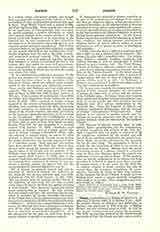

Plessis, JOSEPH-OCTAVE, Bishop of Quebec, b. at Montreal, March 3, 1763; d. at Quebec, December 4, 1822. He studied classics at Montreal and philosophy at Quebec, was appointed in 1783 secretary to Bishop Briand, and was ordained priest in 1786. In 1797 he was named vicar-general and chosen for coadjutor. The bulls having been delayed by the imprisonment and death of Pius VII, Plessis was only consecrated in 1801. He assumed the greater part of the administration, his superior remaining at Longueuil; by the latter’s death in 1806 he became Bishop of Quebec. The program of the oligarchy then in power comprised the organization of an exclusively Protestant school system; and the subjection of ecclesiastical influence to the royal supremacy and the governor’s good pleasure, in the erection of parishes and the nomination of pastors. Plessis’s aim was to obtain the civil recognition of bishop and clergy, without forfeiting any right or privilege of the Church. His title of Bishop of Quebec, assumed by all his predecessors before and since the Conquest, was odious to the officials and to the Anglican bishop. Plessis, by his firm yet deferential attitude, his prudence and moderation, and his loyalty to the Crown, removed all opposition. He wisely resisted every offer of temporal betterment to maintain the fulness of his spiritual jurisdiction. When the American Congress in 1812 declared war with England, Plessis aroused the loyalty of the French Canadians, who by remarkable victories, notably at Chateauguay, saved Canada to Great Britain. The bishop was honored with a seat in the Legislative Council, his title and dignity officially recognized, and the creation of vicariates Apostolic in Upper Canada, Nova Scotia, and Prince Edward Island approved of. He succeeded in preventing the application of the odious monopolizing educational law called the “Royal Institution”. An energetic and enlightened patron of education, he redeemed Nicolet College, generously contributing to reorganize, enlarge, and endow it; he likewise favored the foundation of St-Hyacinthe College, whose regulations he wrote, and established a Latin school at St-Roth to prepare students for seminary or college.
Three times after his consecration he visited every parish in Lower Canada; in 1811 and 1812 he travelled through the Maritime Provinces, and in 1816 to Upper Canada. Long since convinced of the necessity of dividing his immense diocese, he strove to create new sees. Nova Scotia was separated in 1817. To realize the formation of other dioceses in Upper Canada, in the North-West, in Prince Edward Island, and at Montreal, Plessis crossed the Atlantic in 1819 to negotiate with Rome and England. Anticipating the conclusion of the case pending before the British Government, Rome had made Quebec a metropolitan see, with two of the above-named for suffragans. The new archbishop successfully counteracted English susceptibilities, alarmed at his promotion, and obtained the other two dioceses he had in view. He likewise succeeded in preventing the Sulpicians from losing by expropriation their seigniory of the Island of Montreal. Public opinion had improved since Briand’s time. On his return voyage, Plessis, at the request of Propaganda, visited Philadelphia and Baltimore. When in 1822 the House of Commons proposed a bill for the legislative Union of the two Canadas, whereby the French Catholic province would have been the sufferer, Plessis, though stricken with the disease that was to end his life, undertook an active campaign by letter to avert the disaster. His advice and influence strengthened the delegates who had been sent to England to prevent the passing of the bill.
LIONEL LINDSAY

